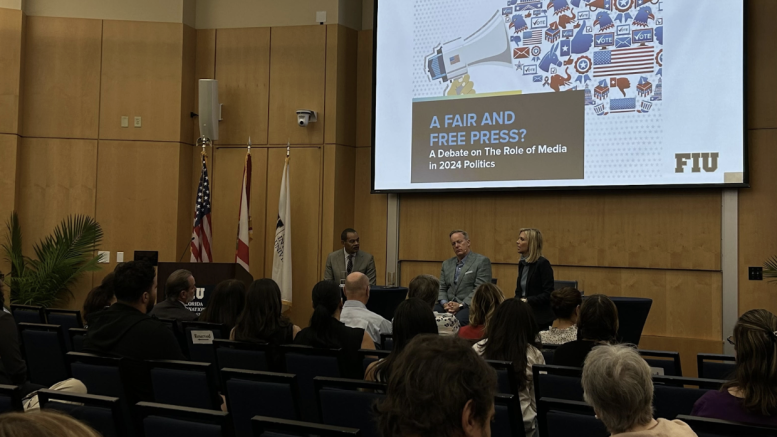Danette Heredia | Staff Writer
The Office of Public Policy Events, with the support of our Lee Caplin School of Journalism and Media and the School of Communication, hosted a debate on April 9th to dissect the influence media has on today’s political climate, bringing former President Barack Obama’s White House Director of Press Advance and former President Donald Trump’s White House Press Secretary to share opinions and experiences.
Johanna Maska, White House Director of Press Advance for former President Barack Obama, and Sean Spicer, White House Press Secretary for former President Donald Trump, sit down at an interactive debate to discuss how media outlets have failed to deliver to the people, but how they also have uplifted them.
Media outlets today depend on their viewers for ratings and revenue, naturally leading CEOs to adopt a business approach where they feed viewers what they most likely want to hear for optimal revenue.
“When you are getting your information from YouTube or Instagram alone, know the business model behind that media source and know their incentives,” said Maska, connecting the business model in the news to the potential harms behind social media algorithms.
This idea of media outlets covering topics for a certain demographic can also be celebrated, believes Spicer, as it promotes a diversity of opinions for the people to choose from liberty of choice.
“I love the fact that there’s a diversity of opinions and ideas. It’s truly a market force driven if people don’t want to watch,” says Spicer.
Because we live in an atmosphere with many varying diverse mindsets, listening and understanding there is a spectrum of opinions embedded within each topic is just as important as teaching one’s own opinions.
“Yes? No? Black or white questions that undermine the intellectual reality of what’s happening, and I think that to me is the biggest issue right now,” says Spicer.
The speakers advised that understanding this spectrum and coming prepared with background knowledge are two key initiatives for every journalist.
“When people do all that hard work, they can make it look easy,” Maska concludes, advising students to prepare for even the smallest or most knowledge of topics.
Editor’s Note: an earlier version of this article incorrectly stated that this event was hosted by the College of Communication, Architecture and the Arts. This version has been updated to reflect the correct hosts.






Be the first to comment on "Former White House Press Leaders Debate on Today’s Media Landscape and its Connection to Political Polarization"